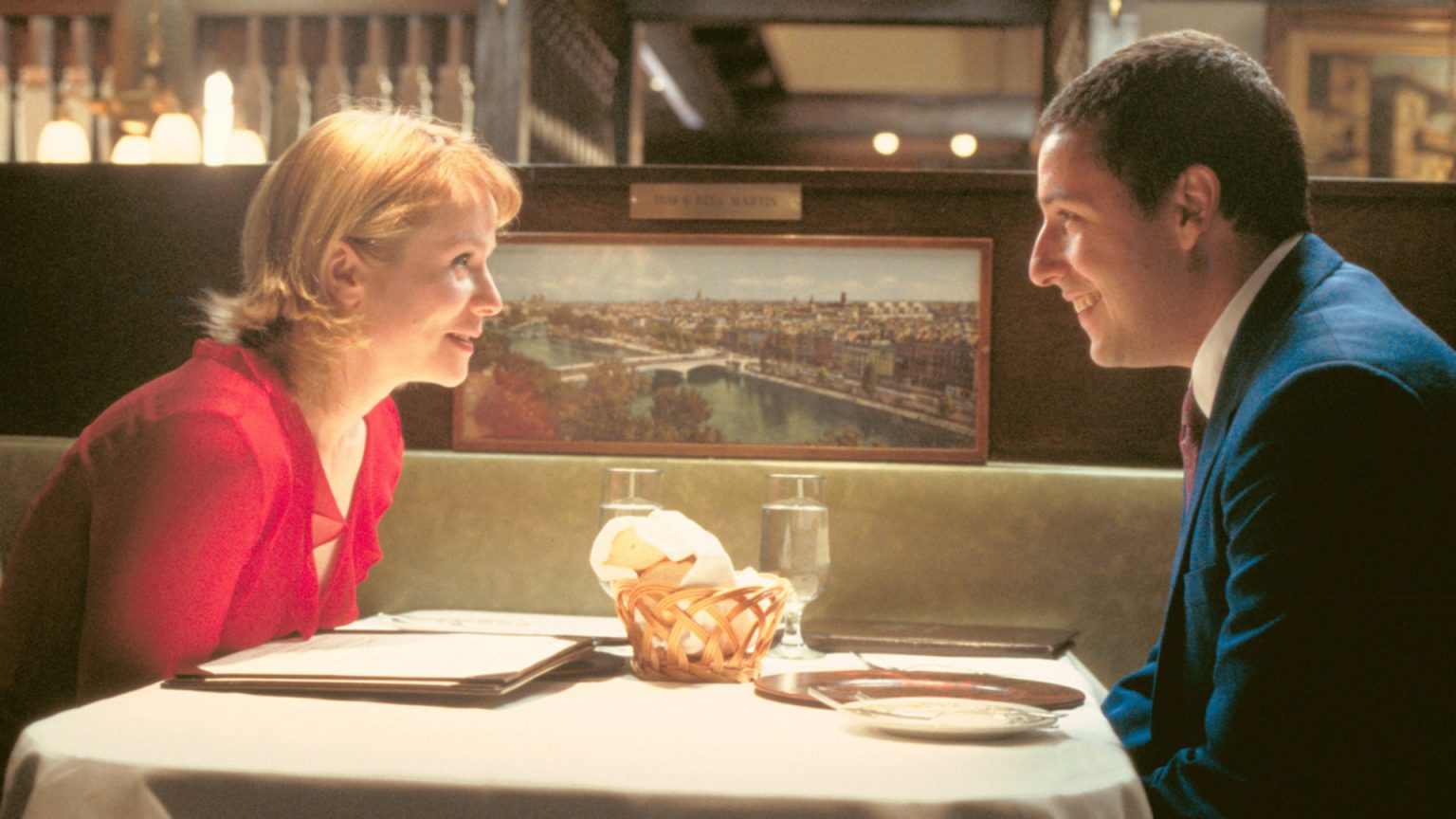For many casual moviegoers, Paul Thomas Anderson films can feel entirely strange. And while digital age touchstones like There Will Be Blood (2007), The Master (2012), Inherent Vice (2014), and Phantom Thread (2017) underline the director’s artistic polish and progression as a filmmaker, they’re just weird enough to polarize viewers. Like Anderson’s nineties filmography, his twenty-first century films have a quirky narrative tone, only they don’t guide the audience as much with traditional awards season moments. Boogie Nights (1997) remains infamous for its celebrities-as-porn stars aesthetic and Magnolia (1999) features a montage of the film’s stars singing Aimee Mann’s “Wise Up.” These are “moments” within strange films, but they don’t keep the films from remaining accessible. Similarly, Punch-Drunk Love (2002), a ninety-five minute romantic comedy full of underdog charm, pulls at viewers’ heartstrings with big kisses and a sweeping score. And it also represents Anderson’s farewell to “a-ha” filmmaking,
Punch-Drunk Love stars Adam Sandler as Barry Egan, a well-meaning businessman that struggles with his place in the world. His seven sisters overwhelm him with phone calls and humiliating reminders, while others take advantage of his nice guy persona. Even though Barry may feel alone, the lovely Lena Leonard (Emily Watson) sees potential. Smitten by his appearance, she plots to meet Barry. And why? The same reason that Barry purchases mass amounts of pudding for Frequent Flyer coupons: a feeling. This “feeling” drives Punch-Drunk Love’s narrative, much like it drives romance in general.
Unfortunately for Lena, Barry doesn’t immediately respond to her advances. He lies under pressure, breaks down in public, and calls sex lines. He anticipates humiliation, betrayal, and constant misrepresentation. Barry’s sisters’ immediately provoke him at a party, reminding him of his adolescent moniker, “gay boy.” After a small, but violent breakdown, Barry seeks psychological help from his brother-in-law, a dentist. Yes, Barry appears purely pathetic at times, but he’s also undeniably funny. Therein lies the beauty of Sandler’s casting.
During Punch-Drunk Love’s press tour, Anderson described Sandler’s nineties movies as “chicken noodle soup,” which sheds light on the director’s state of mind after making the deeply personal Magnolia. Through Barry’s misadventures, Anderson balances tragedy with comedy. In the film’s public settings, Sandler often plays the buffoon, muttering underneath his breath and smiling nervously through difficult situations. In private settings, Barry’s humanity emerges—he’s alone, confused by hopes and fears, trapped by his own inability to love. If life’s a jigsaw puzzle, Barry hasn’t yet embraced the process. He’s part Billy Madison, part Happy Gilmore—an amalgam of classic Sandler movie characters.
In Punch-Drunk Love, Jon Brion’s quirky score informs viewers about Barry’s frazzled mind, while a more traditional sound livens up the most romantic moments. As Anderson has noted, the film’s about “finding your music.” Early on, Barry steals a harmonium from the street, and there’s no real logic to his decision. It’s a gut instinct. He needs to play, even if he’s not sure the notes will resonate. Most importantly, he doesn’t give up.
Nor does Lena give up on Barry. She’s communicative through Punch-Drunk Love, fully willing to push the romantic narrative along. Barry eventually drops his guard, at least until he’s reminded about his personal flaws, usually through his sisters’ stories. As Lena, Watson endearingly contrasts Punch-Drunk Love’s world of emotionally-empty characters, always investigating Barry’s personality while never making him feel judged. Barry seeks redemption and Lena seeks relationship transparency. They are two underdogs in touch with the other’s point of view.
Visually, Anderson communicates Barry’s journey of enlightenment through white light, blue streaks, and atmospheric walk spaces. Sandler’s character passes through apartment hallways, hospital corridors, grocery store aisles, and airport lanes—he’s constantly on the move, a walking unsolved mystery. Punch-Drunk Love’s symmetrical framing presents Barry almost like a roaming spirit, with his uniform representing an emotional death. But a light consistently shines on Barry, and Punch-Drunk Love suggests that many underdog romances thrive by transferring overwhelming energy into positive momentum. For Barry, he must confront the individual who personifies the film’s negative force: Philip Seymour Hoffman’s Dean Trumbell, a mattress man and sex line schemer.
On his own, the late Hoffman delivers a classic Paul Thomas Anderson performance. But he shines most when paired with Sandler. With his long blonde hair, mischievous grin and blunt manner of speech, Dean embodies the traditional bully and contrasts Sandler’s tragicomic hero. Through brilliant character acting and directorial finesse, Punch-Drunk Love is accessible, convenient, and easy to follow; it’s a perfect starting point for those looking to immerse themselves into Anderson’s more cryptic films.
For one reason or another, underdogs often slip through the cracks. Likewise, subtle comedy in Paul Thomas Anderson’s films can be lost on moviegoers if they’re not paying attention. Punch-Drunk Love, however, delivers a clear message: love, laugh, and learn; fight for your right to be understood.
Q.V. Hough (@qvhough) is a freelance writer and Vague Visages’ founding editor. From 2014 to 2017, he wrote over six-hundred video scripts for WatchMojo, and he’s the author of their first e-book, WatchMojo’s 100 Decade-Defining Movie Moments of the 1990s. From 2006 to 2012, Q.V. lived in Hollywood, California and worked closely with ABC On-Air Promotions as the production manager for LUSSIER. He now resides in sunny Fargo, North Dakota.




